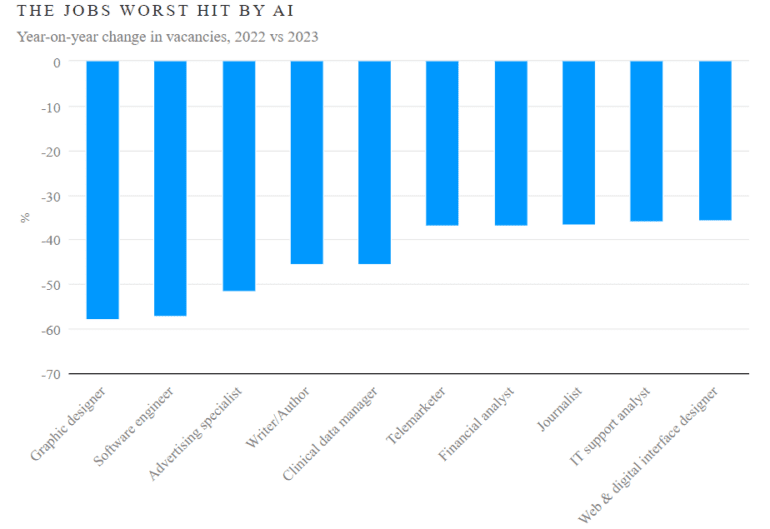TL;DR:
- The technology sector has witnessed a significant drop in job vacancies due to AI’s emergence.
- Graphic designers and software engineering roles have experienced declines of 58% and 57% respectively since 2022.
- AI technology, like ChatGPT and Google’s Bard, contributes to the shrinking of job opportunities.
- Unions call for government regulation of AI in the workplace.
- Britons express concerns about AI adoption, with only 12% believing it will create more job opportunities.
- Customer service jobs are expected to vanish as automation becomes prevalent.
- Skilled white-collar workers are particularly vulnerable to AI replacing their roles.
- AI is predicted to create new job opportunities, such as prompt engineers.
- Entry-level tech jobs disappear as employers demand prior work experience.
Main AI News:
The advent of artificial intelligence has sent ripples of transformation through the technology sector, leaving a profound impact on various job roles, as revealed by recent figures. Job site Adzuna’s analysis has brought to light a striking decline in opportunities for more than a dozen careers that were once deemed most susceptible to AI’s encroachment.
According to Adzuna’s data, the number of vacancies in several professions has plunged by as much as 50% since the year 2022. For instance, the field of graphic designers has seen a staggering drop of 58%, with a mere 691 listed vacancies in July this year, compared to 1,641 in the previous year. Similarly, software engineering roles witnessed a significant decline of 57%, from 20,193 vacancies to just 8,644.
While the current economic stagnation and soaring inflation rates may have contributed to employers’ hesitance in hiring, the prominent influence of AI technologies like ChatGPT and Google’s Bard is undeniable, impacting the landscape of tech jobs. Roles in data management, IT support analysts, and web designers have also taken a hit, with their numbers falling by over a third.
This trend of AI taking over job roles has raised concerns among unions, urging the government to regulate this nascent technology. A recent survey conducted by tech union Prospect revealed that less than half of the respondents were confident that their employers would consult them before introducing AI at their workplace. Andrew Pakes, Prospect’s deputy general secretary, emphasized the need for thorough consultation with workers before implementing such technologies.
In contrast to some other countries, Britons seem increasingly apprehensive about embracing AI, according to a report by pollster Ipsos. Only 12% of those surveyed believed that AI would create more job opportunities than those it would replace. Moreover, just under half (46%) advocated for businesses to adopt AI in their workplace. The report predicts that customer service jobs will be highly impacted, as automation continues to replace human roles.
Looking ahead, the future seems uncertain for many workers, with approximately four in 10 expressing no immediate concerns about AI’s impact on their job in the next year. However, this figure drops to one in four when considering the next five years, indicating growing anxieties about AI’s disruptive potential.
Andrew Hunter, speaking on behalf of Adzuna, highlighted that skilled white-collar workers, whose expertise and knowledge are crucial to their roles, face heightened risks from AI, as the technology becomes increasingly adept at emulating human responses and outputs. While job vacancies have experienced a universal decline, certain positions have witnessed steeper drops, possibly due to the widespread adoption of AI.
Nevertheless, there is a silver lining amidst the AI disruption. Mr. Hunter believes that AI will create new opportunities, such as prompt engineers, as companies scramble to leverage technological advancements.
In parallel, research by the nonprofit employment network Generation has revealed the gradual disappearance of entry-level tech jobs. A staggering 94% of employers across 16 industries now require prior work experience, with two-thirds demanding at least a year of relevant experience.
Conclusion:
The rapid advancement of AI technology has sparked a profound disruption in the job market, impacting high-paying careers across various sectors. While some fields face declining job opportunities, there is a growing demand for skilled professionals to navigate and harness the potential of AI. Businesses must prioritize proper consultation with workers to successfully integrate AI and ensure a sustainable future for the job market.

